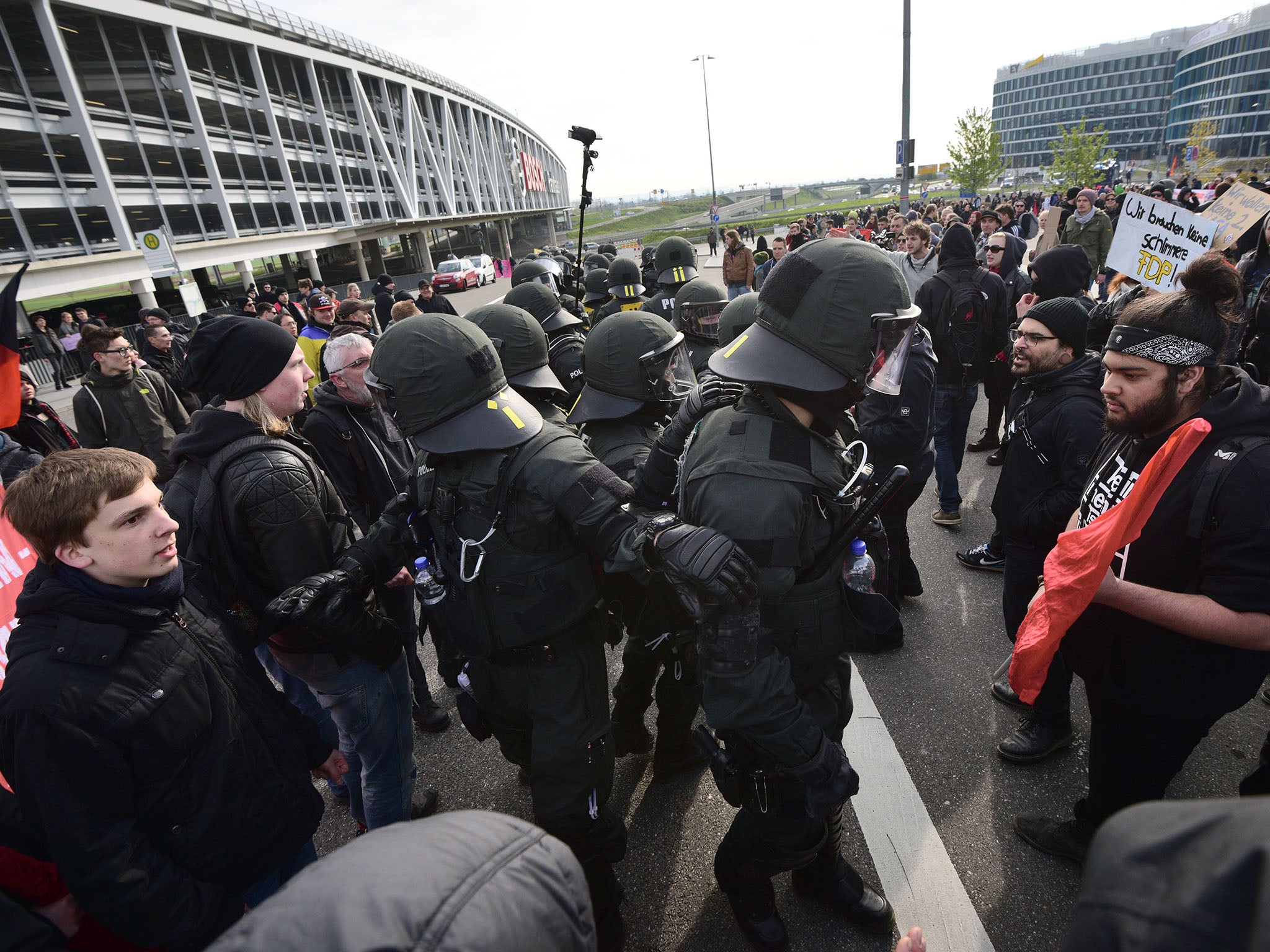Refugee crisis sparks record year for political violence in Germany as right and left wing clash
Right-wing extremists have attacked refugee accomodation, while left-wing protesters have been arrested during clashes

The number of attacks on asylum seekers and refugee accommodation is “exploding” in Germany after a record year for political violence in the country.
Releasing national crime statistics for 2015, the interior minister, Thomas de Maiziere, warned that violence by right and left-wing extremists was increasing at an unprecedented rate.
“The increase in right-wing politically motivated crime (PMK) is seen particularly in xenophobic offences,” he said.
“The number of attacks on asylum seekers’ accommodation has increased more than fivefold on last year.
“This is unacceptable and will be strongly prosecuted by the police and judiciary.”
Political crime rose by almost a fifth in 2015 to a total of almost 39,000 recorded offences – 23,000 from the right-wing (up 35 per cent) and 9,600 on the left (up 17 per cent).
The German interior ministry said the figures represented a “new high” since political crimes started being recorded separately in 2001, which it attributed mainly to a 44 per cent increase in violent crime by right-wing extremists.
But the number of violent crimes committed by the left wing were even higher, rising 35 per cent to 2,246 incidents, largely directed against the police.
“The sharp increase in politically motivated crime points to a dangerous development in society,” Mr de Maiziere said. “We are witnessing a growing and increasingly pronounced readiness to use violence, both by right and left-wing extremists.”
The surge has been attributed to the impact of the refugee crisis, with the far-right attacking migrant shelters and marching in waves of anti-immigration protests being met by attacks from left-wing activists.
Attacks on asylum seekers have been reported, as well as efforts by vigilante mobs to “clean up” Cologne after a string of sexual assaults and robberies on New Year's Eve stoked tensions.
As the number of homes for asylum-seekers swelled, so too did crimes targeting them, which more than quadrupled to 1,031, including four attempted murders, eight explosives offences, 60 assaults and 94 arsons.
Vandalism including the spraying of swastikas and racist and neo-Nazi slogans on migrant accommodation was also included in the category, with only a quarter of the crimes being solved so far.
Germany reacts to Cologne New Year's Eve attacks
Show all 13Mr de Maiziere said the figures for 2016 so far showed that attacks could rise further, with 350 offences recorded in the first three months of this year – triple the figure for the same period in 2016.
Included in this category of crimes were the spraying of swastikas and other neo-Nazi symbols on refugee centre walls, as well as arson attacks.
Hate crime also soared by 77 per cent to 10,373 in 2015, mostly crimes motivated by xenophobia, followed by anti-Semitism, racism and religion.
“The Federal Government is employing all means to use the rule of law to defend against racism, xenophobia and violence to defend,” Mr de Maiziere said.
“But the whole of society is also called on to oppose this increasing radicalisation, both in deed and word.”
The rise of the anti-Islam Pegida group and growing success of anti-immigration party the Alternative für Deutschland (AfD) have been seen as evidence of political polarisation.
With the arrival of more than one million asylum seekers in Germany last year, around 150,000 cases of “unauthorised entry” were recorded and more than 230,000 of people overstaying.
Germans committed three quarters of the offences recorded in 2015 but crimes by foreigners increased 13 per cent, including document forgery, pickpocketing and burglary.
When immigration-related offences were removed from the figures, the number of offences in Germany was almost unchanged from 2014 at just under 6 million.
The largest group of foreign-born offenders were from Turkey, followed by Romania, Poland, Serbia and Italy.
Syrians were involved in 2.6 per cent of the crimes, Afghans 1.8 per cent and Iraqis 1.6 per cent.
Subscribe to Independent Premium to bookmark this article
Want to bookmark your favourite articles and stories to read or reference later? Start your Independent Premium subscription today.

Join our commenting forum
Join thought-provoking conversations, follow other Independent readers and see their replies